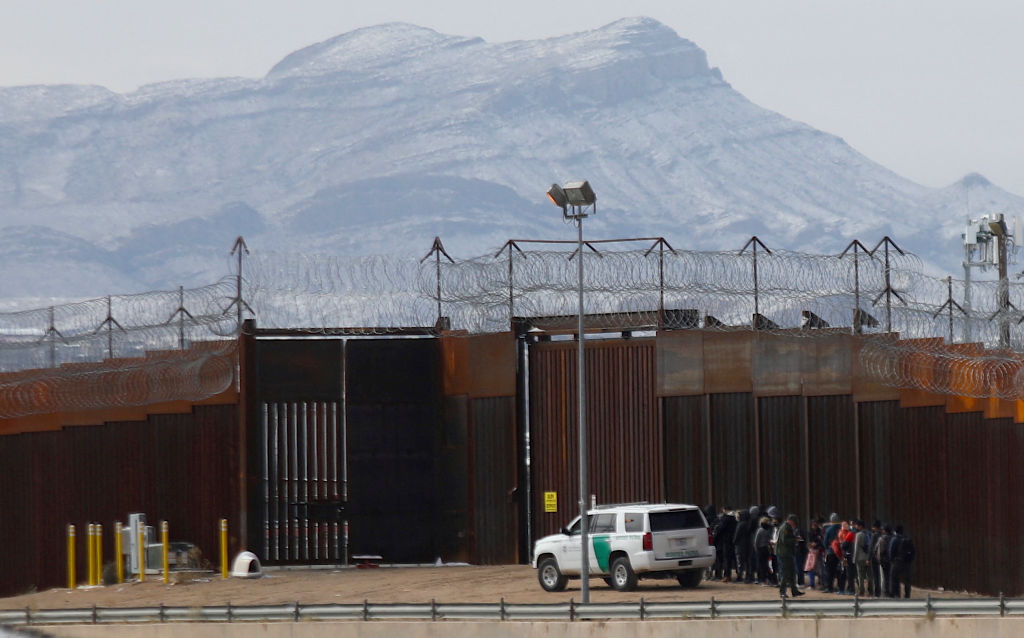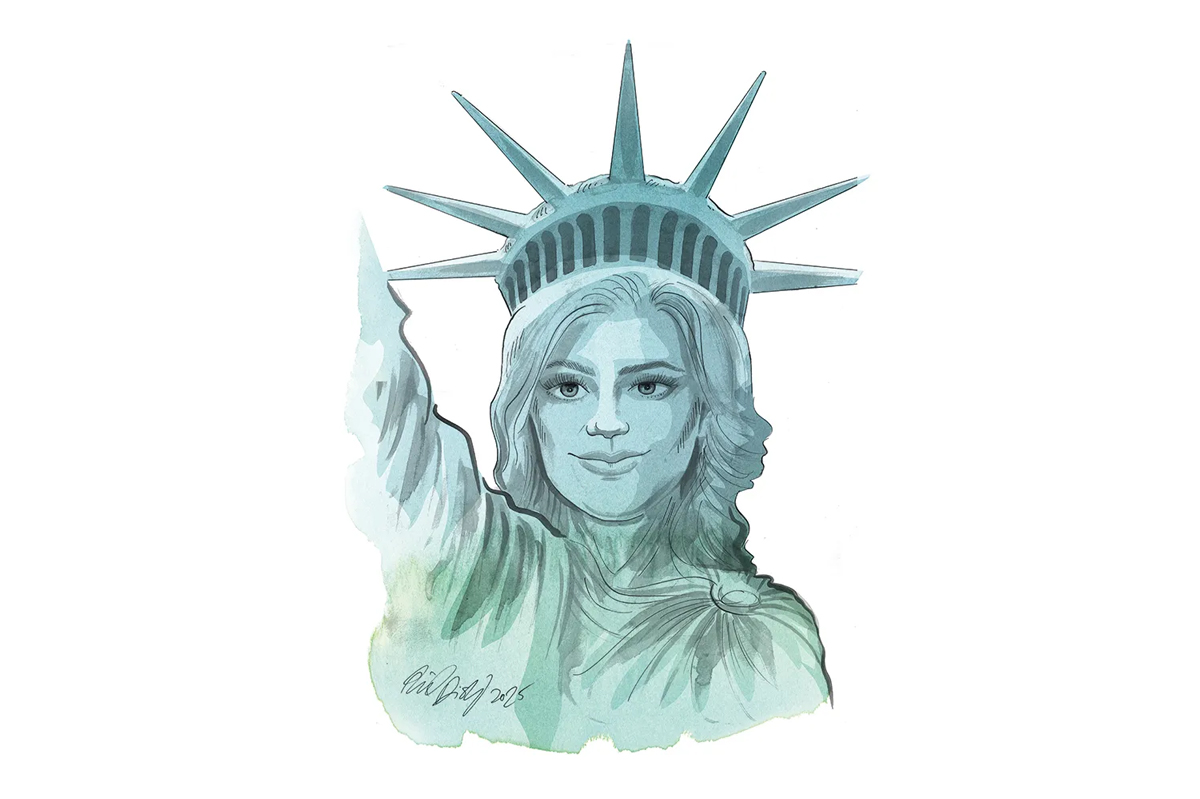Watchers of the news might be forgiven for thinking the Biden administration is worried about the election-year optics of more migrants at our southern border. The International Committee of the Red Cross is predicting high waves of migration through Mexico and Central America. The Department of Homeland Security last week requested help from the Pentagon. Also last week, the administration announced that asylum officers, rather than just immigration court judges, will be permitted to adjudicate the claims of immigrants seeking asylum at the border.
In addition to these initiatives, I’d suggest another policy: do away with birthright citizenship and dual citizenship.
People often ask if the two of our four children who were born in Thailand — where we lived for several years — have dual citizenship. The answer is no. Those children, despite their foreign births, are solely American — though they also cannot run for president of the United States (thank you, Article II, Section 1, Clause 5 of the Constitution!).
Of course, it’s a peculiarly American sensibility that would even think to even ask the question. Of the 195 countries in the world, only 33 of them (and two territories) have jus soli, or unrestricted birthright citizenship — and most of those are in Latin America or the Caribbean. (Last I checked, I don’t believe Jamaica or Nicaragua suffered from a lot of birth tourism.)
A smattering of other nations enforce a modified version of birthright citizenship, which usually involves having at least one parent who has lived in that country for several years, or if one of the parents is a citizen. In the United States, birthright citizenship was only codified in 1898 when the Supreme Court in United States v. Wong Kim Ark interpreted the Citizenship Clause of the Fourteenth Amendment to extend not only to freed blacks who had not enjoyed citizenship privileges in the antebellum South but to any person born in the country.
I’ve come to find the global elites’ infatuation with dual citizenship both absurd and inimical to the actual virtue of citizenship. Sure, we lived in Thailand for several years. We learned a lot about its history, culture, and cuisine. At some point, it really did start to feel like our home wasn’t in the United States. But it was.
Every time the Thais would have a raucous political debate (which they do quite a bit, given they have had twenty constitutions since 1932), my wife and I tried to form our own opinions. But they were opinions formed as outsiders, unfamiliar with the deep complexities of a society with its own ancient roots and rhythms. If the Thais decided to argue over their own history, perhaps reconsidering statues or street names, we would be entirely ill-equipped to engage. For us to go about lecturing the Thais as to how they should govern themselves would have been the height of hubris.
In his new book The United States in Crisis: Citizenship, Immigration, and the Nation State, Edward J. Erler explains that birthright citizenship (and by extension dual citizenship) are later developments in our nation’s history. They are also at odds with our Constitution.
For the American Founders, says Erler, the basis of citizenship was the social-compact principles found in the Declaration of Independence, which rejected the common-law understanding of subjectship that was involuntary and perpetual. The Declaration translated subjects into citizens by making consent, rather than, say, the happenstance and exigencies of birth location, the grounds of citizenship. Thus, just having your kid born in America didn’t make that child a citizen if you yourself were not a citizen whose consent acted on the child’s behalf.
This same political consensus continued into the post-Civil War era. During debates over the Expatriation Act in 1868, many congressmen widely rejected the idea of birthright citizenship. At the time of the ratification of the Fourteenth Amendment, says Erler, “an overwhelming majority of Congress…were committed to the view that foreigners (and aliens) were not subject to birthright citizenship.”
The Fourteenth Amendment is important in this debate, because it was ultimately the aforementioned Supreme Court’s interpretation of that amendment that decreed birthright citizenship legal. Erler argues that United States v. Wong Kim Ark was wrongly decided over the “subject to jurisdiction clause” of the Fourteenth Amendment, which reads: “All persons born or naturalized in the United States, and subject to the jurisdiction thereof, are citizens of the United States and of the state wherein they reside.” That clause, Erler explains, meant that such persons must not be subject to or owe allegiance to a foreign power if they want citizenship.
Moreover, the language in our nation’s current oath for naturalizing citizens entails a rejection of dual citizenship. That oath demands that its adherents “renounce and abjure absolutely and entirely all allegiance and fidelity to any foreign prince, potentate, state, or sovereignty of whom or which the applicant was before a subject or citizen.” That would, of course, imply that such persons must renounce any prior citizenship or nationality. Indeed, there is no US law stipulating US citizenship — it is simply an administrative decision of the Department of State. Dual citizenship wasn’t permitted in the United States until 1967 when the Supreme Court in Afroyim v. Rusk ruled that US citizens may not be deprived of their citizenship involuntarily.
There are multiple, sometimes overlapping problems with birthright citizenship and dual citizenship that undermine the foundations of national sovereignty. Both presume a “world without borders” in the sense that people can easily move to other countries and demand those countries recognize them as citizens, even if their connection to those places is tenuous at best.
Citizens — opposed to clients who live at the behest of elites — can only exist only in independent nations where certain exclusive rights and privileges belong to a single people who consent to be members of a political community. “Free government — constitutional government and the rule of law — has existed only in separate, sovereign nations,” observes Erler. “The sovereignty of the nation-state is the surest way to guarantee the rights and liberties of citizens.”
Moreover, the diversity regime perpetuated by birthright citizenship and dual citizenship also vitiates one of the necessary components of the nation state: cultural unity. Even the Framers understood this. In Jefferson’s Notes on the State of Virginia, he warned that allowing a large number of immigrants to enter the country would make it “more turbulent, less happy, [and] less strong.” Greater cultural and linguistic diversity inevitably results in citizens having less in common, including a coherent conception of the common good necessary for republican government.
Large numbers of immigrants, says Erler, have more difficulty adapting to American customs, habits and laws and demonstrate less willingness to do so. This in turn translates to more people becoming dependent on the administrative state. Moreover, by promoting multiculturalism, the state actually encourages immigrants to resist integration into American society. “Any nation that believes that diversity is its strength has already made the decision to dissolve itself,” writes Erler. “Anyone can see today that the nation is dissolving — its unity lost, with tribes, race, ethnicities, and various other identity groups competing for superiority.”
The idea of a “global citizen,” a concept constantly promoted by American elites, is an oxymoron. “To be a citizen,” says Erler, “is to belong to a particular regime, and a particular regime cannot be a universal regime.” Global citizenship, though claiming to count all the world’s residents as one’s neighbor, results in a paradigm in which elites often ignore (or ridicule) those closest to home in favor of the latest pet globalist cause, no matter how remote from where they reside. Or, as Victor Davis Hanson observes in The Dying Citizen, “The more the United States puts its money, its military, its people, and its resources at the disposal of others, the fewer such assets will be available to serve the interest of its own citizens.”
In our time of domestic and international distemper, our nation requires a concentration, not disbursement, of our wealth and political capital. Overstretched empires, as any historian will tell you, are a recipe for internal disunity and eventual dismemberment.
As long as America perpetuates citizenship practices that actively erode the principles of republican government and sovereignty, we should not be surprised that the bonds of civic unity continue to fray, or that millions of migrants are willing to abuse our lax policies to realize their own American dream.

























